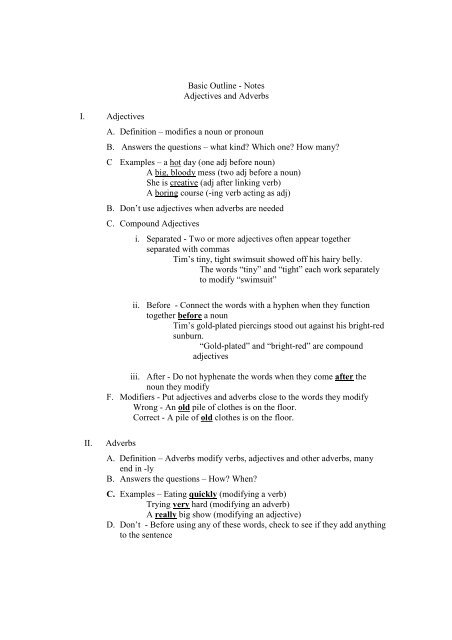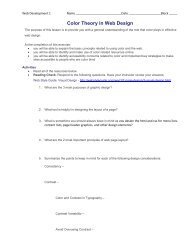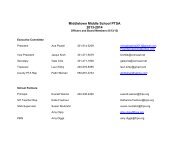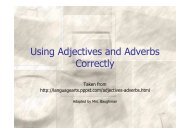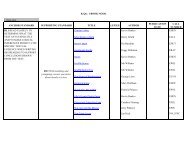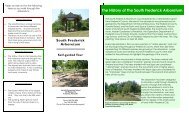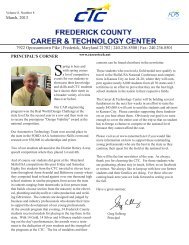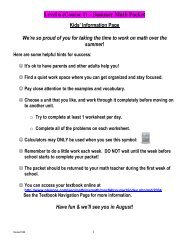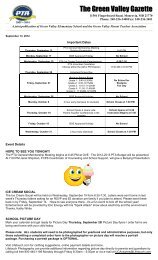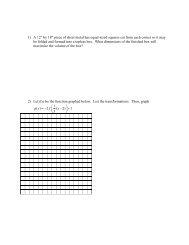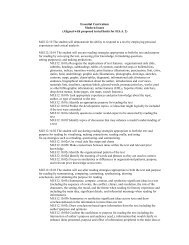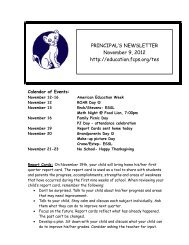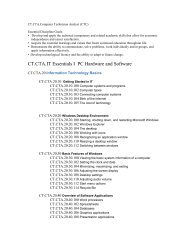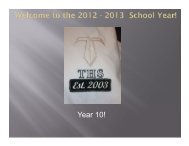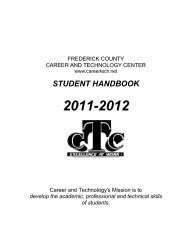Adjective and Adverb Outline Notes
Adjective and Adverb Outline Notes
Adjective and Adverb Outline Notes
You also want an ePaper? Increase the reach of your titles
YUMPU automatically turns print PDFs into web optimized ePapers that Google loves.
I. <strong>Adjective</strong>s<br />
Basic <strong>Outline</strong> - <strong>Notes</strong><br />
<strong>Adjective</strong>s <strong>and</strong> <strong>Adverb</strong>s<br />
A. Definition – modifies a noun or pronoun<br />
B. Answers the questions – what kind? Which one? How many?<br />
C Examples – a hot day (one adj before noun)<br />
A big, bloody mess (two adj before a noun)<br />
She is creative (adj after linking verb)<br />
A boring course (-ing verb acting as adj)<br />
B. Don’t use adjectives when adverbs are needed<br />
C. Compound <strong>Adjective</strong>s<br />
i. Separated - Two or more adjectives often appear together<br />
separated with commas<br />
Tim’s tiny, tight swimsuit showed off his hairy belly.<br />
The words “tiny” <strong>and</strong> “tight” each work separately<br />
to modify “swimsuit”<br />
ii. Before - Connect the words with a hyphen when they function<br />
together before a noun<br />
Tim’s gold-plated piercings stood out against his bright-red<br />
sunburn.<br />
“Gold-plated” <strong>and</strong> “bright-red” are compound<br />
adjectives<br />
iii. After - Do not hyphenate the words when they come after the<br />
noun they modify<br />
F. Modifiers - Put adjectives <strong>and</strong> adverbs close to the words they modify<br />
Wrong - An old pile of clothes is on the floor.<br />
Correct - A pile of old clothes is on the floor.<br />
II.<br />
<strong>Adverb</strong>s<br />
A. Definition – <strong>Adverb</strong>s modify verbs, adjectives <strong>and</strong> other adverbs, many<br />
end in -ly<br />
B. Answers the questions – How? When?<br />
C. Examples – Eating quickly (modifying a verb)<br />
Trying very hard (modifying an adverb)<br />
A really big show (modifying an adjective)<br />
D. Don’t - Before using any of these words, check to see if they add anything<br />
to the sentence
Really, very, absolutely, extremely, quite, actually, somewhat,<br />
rather<br />
E. Modifiers – wrong -I can’t quite do this as well as Fred.<br />
Correct - I can’t do this quite as well as Fred.<br />
III.<br />
Comparative <strong>and</strong> Superlative Forms<br />
i. Comparative means use the comparative form to compare two<br />
things<br />
ii. Examples –Sally is the larger of the twins. (not largest)<br />
iii. Don’t use - Don’t use “more” or “most” with –er or –est<br />
Yesterday was more hotter than today<br />
That was the most dirtiest story I ever heard<br />
You are the bestest teacher<br />
B. Superlative means use the superlative form to compare three or more<br />
i. Examples – August was the hottest month of the year.<br />
ii. Don’t use -<br />
C. Absolute concepts<br />
i. Definition – Absolutes have only two possibilities, on or off, yes or<br />
no, with nothing in between<br />
ii. Examples - The most perfect student in the class<br />
A very unique idea (say “very unusual” instead)<br />
These words express absolute concepts that cannot be<br />
modified


